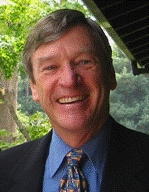March 2009
 Former Senate Chair Pitts takes over as Interim Provost
Former Senate Chair Pitts takes over as Interim Provost
UC San Francisco Professor of Neurosurgery and 2003-2004 Academic Council chair Lawrence H. “Larry” Pitts has been appointed interim provost and executive vice president for academic affairs. Pitts, who has served in numerous Senate leadership positions over his 30 plus years of UC service, was also a recipient of the 2008 Oliver Johnson Award for distinguished service to the Academic Senate.
He arrived at the Office of the President on February 9 for an expected six-month appointment facing a number of daunting challenges and tasks – among them, an unfavorable budget environment and the goal of completing the Division of Academic Affairs restructuring by the end of the 2008-09 academic year.
Interim Provost Pitts says the steady decline in state budgetary support for the University over the past decade, which has only increased in recent times, puts UC in a position of having to work more efficiently than ever to carry out its teaching, education, and research missions. His primary goal now, he says, will be to determine how to continue supporting the faculty, graduate students, and all critical elements of research and education to keep the University strong.
“Everybody will have to work together to minimize the damage of these budgetary shortfalls, but I hope the faculty understand that the Provost and administration, both at UCOP and at the campuses, are utterly committed to supporting their work. I want them to know that even in bad times, when faculty may feel severe constraints, everyone is trying to support them the best we can, and we will turn to the faculty constantly for discussions about how to optimize our operations in these difficult times.”
The Interim Provost is being advised by the newly formed Budget Strategies Advisory Group, which is co-chaired by Senate Chair Mary Croughan and UCSB Executive Vice Chancellor Gene Lucas, and includes the chairs of UCAP and UCPB. The charge of that group includes identifying the most appropriate responses to immediate budget shortfalls by collecting best campus practices for efficiencies and looking at “out of the box” solutions. Some campuses, for example, have been forced to dramatically scale back or delay their plans for new hires; the Advisory Group will examine some of the best practices campuses are using to decide which new hires should go forward.
There is no specific plan to implement either furloughs or pay cuts right now, he emphasized, but those potential solutions are some of the many ideas the Advisory Group will consider. He wants to receive as much faculty input as possible into these questions, and is actively seeking advice from the Senate leadership and systemwide committees. “Some ideas will seem distasteful – higher student fees, and furloughs or pay reductions for faculty and staff, for example,” he said, “but all options have to be explored, if only to be ruled out.”
The second goal of the Advisory Group will be to examine long-term budget strategies and contingencies, which will also mean confronting some of the philosophical questions that UC – and higher education more generally – will have to address if state support does not improve. “We need to talk about what UC should look like in ten years. I assure you that from every corner – faculty, administrators, deans, and chancellors – we all feel that maintaining a high quality, universal education at each campus is a top priority, and that UC needs to continue doing what it is doing and do it well. But realistically, if funding does not improve, it will mean that the size or nature of the University of California may have to change.”
Pitts says that his past Senate experience has helped prepare him for his new position, as he knows Senate processes and players well. “I certainly intend to take full advantage of my working relationship with the Senate,” he said. “Knowing the Senate’s structures and how issues move through them, and knowing the prominent people, is invaluable.” As a former Senate chair, he says, “I respect and enjoy the process of shared governance. The Senate has its ways, and I respect them because they have been very effective.”
Interim Provost Pitts says that he accepted the six-month appointment because he was attracted to the dynamic atmosphere of change and to another chance to make a difference. “Between the restructuring of the Office of the President, the budgetary problems, and significant issues before the University right now, and given my Senate background and my strong belief that the faculty need to be supported, I am happy to accept the challenge. I am happy to serve insofar as I can facilitate the best outcome, so that we end up with the best supported faculty, students, and staff, and so that the restructuring can be done in a way that advances the fundamental mission of the University.”
